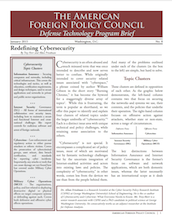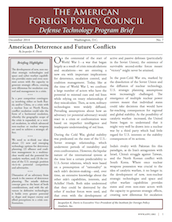Russia Reform Monitor: No. 1951
New salience for the Islamic State;
Russia's info war against the West
New salience for the Islamic State;
Russia's info war against the West
You have to feel a bit sorry for the Obama administration. The White House in December announced plans to normalize diplomatic relations with Cuba, including establishing a U.S. Embassy in Havana and formally revisiting Cuba's status as a state sponsor of terrorism. The move was a clear effort by Washington to distinguish itself in a new international theater.

Cybersecurity is an often abused and much misused term that was once intended to describe and now serves better to confuse. While originally intended to cover security related issues associated with “cyberspace,” a phrase coined by author William Gibson in the short story “Burning Chrome,” it has become the byword for a staggeringly diverse array of topics. While this is frustrating, the term is popular as shorthand, so we offer this paper to identify and explain four clusters of related topics under the larger umbrella of “cybersecurity.” Each is a distinct issue area with unique technical and policy challenges, while retaining some association to the others...
Fighter planes for Argentina;
Banning the Islamic State
The state of the union is great if you happen to be Iran.
On Tuesday, during the State of the Union address, President Barack Obama discussed his view of the continuing controversy over Iran's nuclear program. "Our diplomacy is at work with respect to Iran," he said, "where, for the first time in a decade, we've halted the progress of its nuclear program and reduced its stockpile of nuclear material."
Kudrin: Russia on the cusp of "
full-fledged"
economic crisis;
Kyiv moves West, riling Moscow
"First they came for the Socialists, and I did not speak out - because I was not a Socialist," German pastor Martin Niemoller famously observed about his nation's intellectuals during the Nazi rise to power. "Then they came for the Trade Unionists, and I did not speak out - because I was not a Trade Unionist. Then they came for the Jews, and I did not speak out - because I was not a Jew. Then they came for me - and there was no one left to speak for me."
Indian Ocean may be next desitination for Chinese oil rig' Big stakes in Sri Lanka election;
China hosts Taliban, may push reconciliation;
India, Pakistan continue trading fire at LOC
New signs of life among the Russian opposition;
Moscow maintains focus on nuke modernization, and the Arctic
Christmas-related events banned in one Chinese province;
Turkey saves Uighur refugees in Thailand from repatriation to China
Is Russia rethinking preemptive nuclear war?;
Funding only for patriotic films
One of the first orders of business for the new Congress may be to consider a resolution authorizing the use of force resolution in Operation Inherent Resolve, the U.S.-led combined joint mission against the Islamic State group. Such a move would be long overdue.
China drops in Corruption index;
Pro-China party suffers major losses in Taiwan elections
The recent resignation of Chuck Hagel as US defense secretary is a sign of the times. During his short, unglamorous tenure as the Obama administration's defense chief, Hagel had become a symbol of the White House's failed foreign and defense policies.
A direct hit for Aegis...;
...and bullseye for Bulava;
Defending Russia;
A setback for the arrow;
High-flying homeland defense;
Qatar buys American
In the wake of the hacking of Sony, all eyes are now on North Korea's disruptive online capabilities. But the cyberwarfare potential of another rogue state — Iran — is also growing, and it could soon constitute a major threat to the United States and its allies.
China opens new land route to Nepal;
Retired PLA Gen: China won’
t save North Korea in war
Since Vladimir Putin launched his war against Ukraine back in February, speculation has run rampant about the Russian president's objectives. While objectives change in the course of any war, Mr. Putin himself has admitted that the invasion of Crimea was a strategic decision that, therefore, had strategic objectives in mind. Those objectives also relate to the current fighting in the Donbas region (encompassing Ukraine’s Donetsk and Luhansk provinces). As such, Russia's conduct repudiates the speculation in Washington that Russia's Ukraine policy is something of an improvisation. Rather, U.S. policymakers would be well-served in trying to figure out the factors driving Mr. Putin's decision-making, both at home and abroad.
Iran's cyber threat, revisited;
Ahmadinejad's second act?;
Back to the territorial drawing board;
A new social ill: Shacking up;
Acid unnacountability
Movement on Russian demographics... and missile defense;
Moscow's media boss in the Congressional crosshairs

On the centennial of the start of World War I—a war that began largely as a result of crisis miscalculations and escalations—we are entering a new era with important implications for deterrence, escalation control, and coalition management. Today, like at the time of World War I, we confront a large number of actors who have the potential to misread cues and red lines while relying on treaty relationships if they miscalculate. Then, as now, military technologies were widely diffused. Prevailing assumptions about how an adversary (or potential adversary) would react in a crisis or confrontation were based on imperfect intelligence and inadequate understanding of red lines...
America's discussion about missile defense tends to be a one-sided conversation. More often than not, it revolves around what capabilities the United States has fielded to date, and what it plans to provide to its allies overseas. But in the not-too-distant future, the United States might be able to count on a new voice in the missile-defense debate, as political and intellectual shifts progressively nudge Canada into alignment on the need to defend North America against ballistic-missile attack.
This month, the OnCue Express gas station in Oklahoma City lowered its price for a gallon of regular gas to $1.99.
Nationwide, the average price is $2.41 per gallon, down from a high of $3.70 the end of April. Gas prices are the lowest they have been in five years and are expected to decline further, following the $50 collapse in oil prices since this summer.
Renewed terror in Chechnya;
A "
delusional"
State of the Nation
Putin's plan to make friends and influence people;
A shift in energy direction
As talks between U.S.-led global negotiators and Iran over its nuclear program resume this week in Geneva, the most welcome shift on the Iranian nuclear front may be occurring thousands of miles away in Washington.
Ukraine suffers more afflictions than Job. Most Western attention focuses on responding to the military confrontation with Russia and then on the economic and political consequences of two decades of oligarchic misrule. However, Ukraine also inherited at independence a genuine crisis in health and demographics, the product of catastrophic policies of the Soviet era compounded by the continuing stress of the post-Soviet transition.
How Putin does political business;
The EU goes wobbly
Big gains for DPP in Taiwan;
China accelerates artificial island-building in South China Sea
Secretary of State John Kerry is confident that an agreement on Iran's nuclear program can be concluded in three to four months, or sooner. But maybe it will be later - or maybe not at all.
In recent months, discussions of Russia in Washington and European capitals have focused on the Kremlin's ongoing neoimperialist aggression against Ukraine. But Wednesday's coordinated terrorist assault on the Chechen capitol of Grozny—which left at least 20 dead and scores more injured—should refocus global attention on a problem that Russia itself increasingly is confronting: a resilient wave of radical Islam.
China reveals new anti-ship cruise missile...;
...and tests new anti-satellite weapons
A mounting buckwheat panic;
Fear and loathing in Moscow
China cracks the whip on Nepal over Tibetans;
Another joint DPRK-China project is put on hold
Economic storm clouds on the horizon;
Russia, Pakistan eye post-Coalition future
Narrowed horizons for nuclear, space cooperation;
Russia's soldiers versus Putin's Ukraine policy
How China helps the IRGC;
New nuclear cooperation with Russia;
A broadcasting controversy;
Iran's covert nuclear work continues;
Iranian blogger released
A new mission for Iron Dome;
Tit-for-tat defenses in Eastern Europe;
India's Nirbhay takes flight;
Romania's new role;
Washington eyes expanded Asian presence;
Taiwan strengthens deterrence
Secretary of Defense Chuck Hagel was reportedly eased out of the Pentagon because President Barack Obama did not think he was the right man for the job. But finding the right person to replace him will require clear thinking from the White House on the dangerous state of the world.
Iran, Russia expand nuclear ties;
The Ukraine war, round two
Senior PLA general admits to taking “
huge bribes”
China expanding reefs in South China Sea
How Russian hackers compromised U.S. critical infrastructure;
One, two, many Putins
Al Qaeda sets sights on China;
China establishes new Asian Bank
Europe stays the course on Russia sanctions;
Is Russia the key to a nuclear deal with Iran?
Nothing better showcases Washington’s confusion over foreign policy than the idea that – as part of a U.S.-Iran nuclear deal – Iran would ship much or all of its enriched uranium to Russia, and Russia would then process it for Iranian civilian usage.
Ukraine votes for the West;
Moscow moves against Islamic State sympathizers
Welcome to the Ukraine war, round two. In recent days, European observers, NATO forces and media outlets have all reported what amounts to a massive influx of Russian war material and personnel into Ukraine — a development that has fanned fears of a fresh cycle of violence between Moscow and Kiev. The news is a timely reminder that the conflict precipitated earlier this year by Russia's annexation of the Crimean Peninsula and subsequent efforts at subversion in eastern and southern Ukraine is, in fact, far from over.
Iraq update;
Bahrain to publish names of terrorist financiers;
Saudi Arabia funds $3 billion in French arms to Lebanon;
Libyan city, Egyptian militants pledge allegiance to ISIS' Jordan dictates acceptable Islam to clerics
Still more economic turbulence... and mounting protectionism;
Sino-Russian collaboration in cyberspace
Last month, President Barack Obama reportedly wrote a private letter to Iran's supreme leader, the Ayatollah Ali Khamenei, seeking to tie the fight against the Islamic State group to the ongoing negotiations over Iran's nuclear program. The White House purportedly sought to pressure Iran into reaching an agreement by the November 24 diplomatic deadline by hinting that failing to do so would affect American efforts against the Islamic State group.